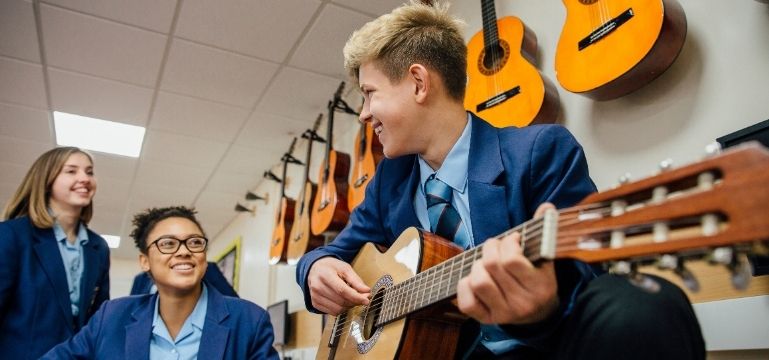The provision of a broad and purposeful curriculum to meet the needs of all learners and its impact on pupil engagement and aspirations

Quick links:
Information about the school
Ysgol John Bright (YJB) is an English-medium 11-18 school maintained by Conwy local authority. It serves the town of Llandudno and the surrounding areas. There are 1,147 pupils on roll, of which 213 are in the sixth form. Around 18% of pupils are eligible for free school meals. Most pupils speak English as their first language, with around 12% of the school speaking English as an additional language. A further 8% of pupils speak Welsh at home. The percentage of pupils with additional learning needs, requiring at least reasonable adjustments, is around 19% of the overall school population.
The senior leadership team (SLT) consists of the headteacher, two deputy headteachers and three assistant headteachers. The school’s vision is summarised in the motto ‘Ysgol John Bright – Our Community of Learning’. This is underpinned by the common principles of equity, well-being and excellence.
Context and background to the effective or innovative practice
YJB serves a diverse catchment area; the school itself is based in one of the poorest wards in Wales, with 10% of the pupil population living in the ward. However, another 10% of the school’s population is drawn from the most affluent wards in Wales. Developing a curriculum that meets the needs of all pupils whilst raising the aspirations of those facing most challenge in society has taken deliberate planning and development over a number of years.
Description of nature of strategy or activity
The curriculum aims to provide a broad range of experiences for all pupils; this includes triple / separate science(s), three international languages at GCSE (French, Spanish and German) as well as prioritising minority subjects such as drama, music and fashion textiles. The school provides vocational courses such as hospitality and catering, engineering and outdoor education in-house to pupils.
In addition to the broad range of in-house subjects on offer, the school works effectively with local partnerships to allow pupils to study other practical courses such as salon services, construction, bushcraft and upcycling. Over the past five years the school has developed a strong partnership with Ysgol y Gogarth, the local special school. YJB students benefit from access to entry level vocational day courses at Ysgol y Gogarth, whilst YJB hosts a full-time class onsite for Ysgol y Gogarth pupils, allowing these learners to access a tailored curriculum drawn from the full suite of courses available in Key Stage 4.
At post-16, the school provides a range of 40 level 3 courses. It is also a key contributor to the local 6th form partnership (LINC Conwy) where pupils from other schools attend on a Wednesday to study outdoor education, fashion textiles and medical science onsite at YJB. At post-16, the school prescribes dedicated ‘super-curricular’ time and resources for students to consolidate their apprenticeship and university applications. A number of students in the sixth form are on blended packages involving extended work placements at local schools, vets and charities.
The school works deliberately to encourage pupils who are impacted by poverty to engage in the breadth of learning experiences available, This includes free individual music and acting lessons, leading to recognised national qualifications. In addition, the school provides funding to ensure trips are subsidised or free for some pupils, such as free trips to see opera productions at the local theatre. There are also opportunities for staff to refer in pupils to the school’s Duke of Edinburgh provision who would benefit from the experience but might not think to sign up.
What impact has this work had on provision and learners’ standards?
The range of courses available allows the school to develop truly bespoke pathways for pupils through their Key Stage 4 and post-16 journey. Establishing such a breadth of provision has upskilled staff to be able to deliver courses within and beyond their specialism. A deliberate and positive outcome is the sequential nature of the school’s approach to curriculum planning from Year 7 through to Year 11 and beyond. This ensures that the curriculum builds carefully on the skills, knowledge and understanding required to progress in a disciplinary way as pupils grow through the school.
This provision has reduced the school’s NEET position to 0 for a number of years at the age of 16. Pupils at risk of permanent exclusion or disengagement in education are successfully engaging with the curriculum and are successful in gaining a place for their onward journey in education beyond the age of 16.
Progression to sixth form is growing, with an improving profile of outcomes for pupils; 41% of all grades awarded in summer 2023 were A* or A. Currently, close to 40% of the school’s university cohort go on to further study at Russell Group universities; a number of them as the first generation from their family to attend university.
How have you shared your good practice?
Within the local authority, the school’s work is shared via the curriculum planners’ forum. The school has contributed to regional consortia events focusing on curriculum design as well as leading the curriculum workstream of the ‘A55 Alliance’, a network of four large high schools in North Wales.